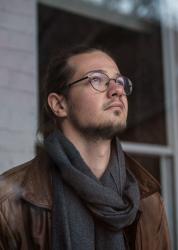The Birth Of A Cemetery
Click above photo for slideshow. (21 photographs)
The Birth of A Cemetery:
A community finds peace after opening
of largest Muslim burial ground in Quebec
What if death wasn’t an end in itself, but a vector for empowerment and recognition instead? This is the vision of Hadjira Belkacem, founder of the Association pour la Sépulture Musulmane au Québec (Association for Muslim Burial in Quebec). Hadjira, an Algerian immigrant who’s been living in Quebec with her family for over 15 years, has worked hard for the community in order to open the province’s largest Muslim cemetery two years ago.
According to the National Household Survey of the year 2011, there were close to 245 000 Muslims in Quebec province, 165,000 of them living in the greater Montreal area. Quebec’s Muslim population has grown over the past fifty years because of an immigration policy which prioritizes a well educated and francophone population hailing from Maghreb countries like Tunisia, Algeria or Morocco.
Despite this significant increase, up until the inauguration of the new cemetery, there was only one within the province that could accommodate the community and offer services that respect the specific rules of Islamic burial. Managed by a local mosque, Hamza cemetery, located in the city of Laval, had long been in poor condition: fractured headstones, flooded spaces, lack of maintenance, general neglect. Although many, including Hadjira Belkacem, voiced complaints against these conditions, religious authorities remained silent.
Facing a dead end, Hadjira and other volunteers took initiative and founded the Association pour la Sépulture Musulmane du Québec in 2013. Its mandate was to find a space to establish a Muslim cemetery free of any link with religious institutions and to offer support to families in their grieving process when the death of a relative occurs. They had to wait for three years and faced numerous rejections from the different municipalities they had approached before the project started receiving positive response. At the end of the negotiations they reached an agreement with Magnus Poirier’s multiconfessionnal cemetery of Laval to establish a space that could host about 3,000 graves dedicated to the community, equipped with a funeral home that will fulfil its specific needs.
The opening of the Muslim cemetery of Laval is a victory for Hadjira, but the work she started is far from being over. When it comes to Muslim death in a context of minority Islam, it’s estimated that 75 per cent of the families prefer to repatriate their dead to their native country instead of burying them in the soil of the land they now call home. This process is expensive and breaks the sacred link that took years to build with their country of adoption, depriving their progeny of concrete roots. This kind of landmark is essential for the youth because it allows them to conciliate their dual identity: the one they inherited from their parents and the one which attaches to Quebec.
If Muslims are more involved in Quebec’s political and social sphere, there is no doubt their positive contribution to our society does not get the recognition it deserves, and is kept in the margin of our larger collective history. Projects like Hadjira’s are milestones for the next generations and will hopefully foster a necessary dialogue leading us to a better understanding of our shared identity.
Français
Et si la mort n’était pas une finalité, mais plutôt le début d’un enracinement identitaire ? La question peut surprendre, c’est pourtant la vision que porte Hadjira Belkacem, présidente de l’Association pour la Sépulture Musulmane au Québec. Hadiira, immigrante Algérienne vivant au Québec depuis plus de quinze ans avec sa famille, travaille d’arrache pied à l’ouverture d’un premier cimetière musulman qui pourra accueillir les morts de la communauté.
Selon l’Enquête nationale auprès des ménages de 2011, il y aurait près de 245 000 musulmans au Québec, dont 165 000 résideraient dans l’agglomération de Montréal. Pratiquants ou non, ce chiffre n’a cessé de croître au cours des cinquante dernières années compte tenu du changement dans les pays sources de l’immigration, favorisant une population instruite et francophone issue en grande partie de pays du Maghreb comme la Tunisie, l’Algérie ou le Maroc.
Malgré cette augmentation importante, la communauté ne disposait jusqu’à maintenant que d’un seul cimetière qui puisse répondre aux besoins spécifiques de l’inhumation selon les principes de l’Islam. Géré par une mosquée, le cimetière Hamza situé à Laval est dans un état lamentable (tombes fracturées, inondations, manque d’entretien, négligence de la part des employés) et de nombreuses voix, dont celle d’Hadjira Belkacem, s’élèvent pour dénoncer ces pratiques. Silence radio du côté des responsables religieux.
Face à cette impasse, Hadjira a fondé en 2013, avec d’autres bénévoles, l’Association pour la Sépulture Musulmane au Québec qui a pour mandat de trouver un endroit où établir un cimetière musulman libre de tout lien avec une institution religieuse ainsi que d’offrir un support aux Québécois de confession musulmane dans leurs démarches lorsque survient la mort d’un proche. Il aura fallu attendre trois ans et essuyer de nombreux refus de la part des différentes municipalités approchés avant que le carré musulman puisse voir le jour. Un accord a été passé avec le cimetière multiconfessionnel Magnus Poirier de Laval pour établir un espace de 3000 tombes réservées à la communauté ainsi qu’un salon funéraire adapté à ses besoins.
L’inauguration du carré musulman de Laval est une victoire en soi pour Hadjira, mais le travail qu’elle a entamé est loin d’être terminé. Lorsqu’il est question de la mort musulmane en contexte d’Islam minoritaire, on estime que 75% des familles préfèrent rapatrier le corps du défunt dans son pays d’origine plutôt que de l’inhumer en terre d’accueil. C’est un processus qui entraîne des coûts élevés et brise ce lien qui aura mit des années à se construire avec le pays qu’ils ont décidé de faire leur, privant leur descendance de racines, d’un point de repère pour concilier leur double identité : québécoise, d’abord, mais aussi celle dont ils ont hérité par leurs parents.
Si les musulmans sont de plus en plus impliqués dans la vie citoyenne québécoise, il n’en demeure pas moins que la mémoire musulmane trouve difficilement le moyen de s’inscrire dans la grande histoire du Québec. Des projets comme celui d’Hadjira sont des jalons posés pour les générations futures et permettront sans aucun doute de poursuivre un dialogue plus que nécessaire pour mieux définir notre identité collective.


